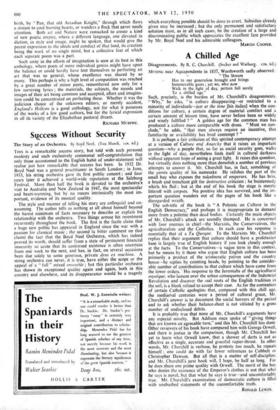A Chilled Age
MUSING near Aquapendente in 1837, Wordsworth sadly, observed:
" The Stream Has to our generation brought and brings Innumerable gains ; yet we, who now • Walk in the light of day, pertain full surely To a chilled age." Such, precisely, is the burden of Mr. Churchill's disagreements.
• " Why," he asks, " is culture disappearing—or restricted to a minority of individuals—just at the time [his italics] when the con- ditions for culture, a certain degree of material comfort and a certain amount of leisure time, have never before been so widely and wisely fulfilled ? " A golden age for the common man has produced a culture more comparable with dross. " Must we con- clude," he adds, " that men always require an incentive, that familiarity or availability has bred contempt ? "
It is perhaps a fair criticism of this spirited contemporary attempt
at a version of Culture and Anarchy that it raises an important question—why a people that, so far as social security goes, walks in the light of day, nevertheless finds itself in cultural darkness without apparent hope of seeing a great light. It raises this question, but virtually does nothing more than demolish a number of previous attempts to answer it. Mr. Churchill has, in fact, something of the gamin quality of his namesake. He relishes - the part of the small boy who exposes the nakedness of emperors. He has brio, a brash and trenchant gift for destructive criticism ; he boisterously whirls his flail ; but at the end of his book the stage is merely littered with corpses. No positive idea has survived, and the im- portant question wanders out of the pages of his book like a disregarded wraith.
The sub-title of the book is " A Polemic on Culture in the English Democracy," and perhaps it is inappropriate to demand more from a polemic than dead bodies. Certainly the main objects of Mr. Churchill's attack are soundly thumped. He is concerned with four enemies in chief—the Marxists, the Conservatives, the agriculturalists and the Catholics. • In each case his response is essentially that of a Tu Quoque. To the Marxists Mr. Churchill replies that their argument that culture should have a proletarian base is largely true of English history if you look closely.enough at the facts. To the Conservatives—a vague term in this context, but he means by it those who argue that English culture has been primarily a product of the 'aristocratic patron and the country house—he replies by counting heads, by pointing to the consider- able number of contributions to that culture which have come from the lower orders.- His response to the Jeremiahs of the agricultural mystique, who lament over the urban consequences of the Industrial Revolution and discover the teal roots of the English tradition in the soil, is a blank refusal to accept their case. As for the contention of certain Catholic apologists that, compared with this chill age, the mediaeval centuries were a period of cultural grace, Mr. Churchill's answer is to document the social horrors of the period and to ask whether their balance-sheet is not vitiated by a gross number of undisclosed debits.
It is probably true that none of Mr. Churchill's arguments have any especial novelty. But Addison once spoke of giving things that are known an agreeable turn," and this Mr. Churchill has done. Other reviewers of his book have compared him with George Orwell, and there is justice in the comparison, though Mr. Churchill has yet to learn what Orwell knew, that a shower of darts is not so effective as a single, accurate and graceful rapier-thrust. In other words, Mr. Churchill is verbose, he protests too much, he repeats himself ; one could do with far fewer references to Cobbett or Christopher Dawson. But all that is a matter of self-discipline. and Mr. Churchill'i next book will, I hope, be half as long. For he does share one prime quality with Orwell. The merit of the boy who denies the existence of the Emperor's clothes is not that what he says is novel, but that what he says is true—and uncomfortably true. Mr. Churchill's examination of democratic culture is filled with unabashed statements of the uncomfortable- truth.
RONALD LEWIN.






































 Previous page
Previous page